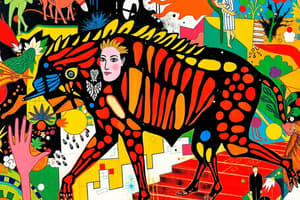Podcast
Questions and Answers
What is a characteristic of an organism that increases its chance of survival in its environment called?
What is a characteristic of an organism that increases its chance of survival in its environment called?
- Community
- Ecosystem
- Adaptation (correct)
- Chemical Change
What term is used to describe the imaginary line around which an object rotates?
What term is used to describe the imaginary line around which an object rotates?
- Equator
- Axis (correct)
- Density
- Energy Transfer
Which of the following describes a physical change that occurs when matter transitions between states?
Which of the following describes a physical change that occurs when matter transitions between states?
- Change of State (correct)
- Density
- Deposition
- Chemical Change
What is a substance made up of two or more elements held together by chemical bonds called?
What is a substance made up of two or more elements held together by chemical bonds called?
Which term refers to an organism that feeds on dead organic matter to obtain nutrients?
Which term refers to an organism that feeds on dead organic matter to obtain nutrients?
What is the term for the shaking of the ground caused by energy release in the Earth's crust?
What is the term for the shaking of the ground caused by energy release in the Earth's crust?
What is the definition of an ecosystem?
What is the definition of an ecosystem?
Which of the following describes the capacity to do work?
Which of the following describes the capacity to do work?
Flashcards are hidden until you start studying
Study Notes
Adaptation
- A characteristic of an organism that helps it survive in its environment.
Axis
- An imaginary line an object rotates around.
- Earth's axis runs through the North and South Poles.
Change of State
- A physical change that occurs when matter changes form (solid, liquid, gas).
Chemical Change
- A reaction or change in a substance that produces a different chemical.
Community
- A group of different species living in the same geographical area.
Compound
- A substance made of two or more elements chemically bonded.
- Has properties unlike the individual elements.
Conservation
- Controlled use and/or maintenance of natural resources.
- Efforts to protect these resources.
Constellation
- A recognizable pattern of stars.
- Often named based on their shape or figure in the sky.
Consumer
- An organism that eats other organisms for food.
Decomposer
- An organism that breaks down dead organisms for nutrients.
Density
- The concentration of matter in an object or area.
- Can refer to the number of individuals of a species in a specific area.
- Measured as mass per unit volume.
Deposition
- The natural process of layering matter.
Earthquake
- The shaking of the ground caused by a sudden release of energy in Earth's crust.
Ecosystem
- An integrated unit of a biological community, its physical environment, and their interactions.
Element
- A substance that cannot be broken down into simpler substances by chemical means.
Energy
- The capacity to do work; a source of usable power.
Energy Pyramid
- A diagram showing the amount of energy available at each level of a food chain.
Energy Transfer
- The change of energy from one form to another (e.g., mechanical to electrical).
Environment
- The sum of conditions affecting an organism, including living and nonliving things.
- Examples include: plants, animals, water, soil, weather, landforms, and air.
Equator
- An imaginary circle around Earth's surface located halfway between the poles.
Studying That Suits You
Use AI to generate personalized quizzes and flashcards to suit your learning preferences.





